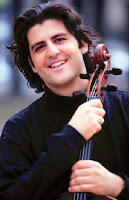PALM BEACH — It’s true, as the program notes indicated, that the Triple Concerto of Beethoven gets slight respect from scholars, but the Goldstein-Kaler-Peled Trio made as a good a case for this hybrid work Tuesday night as you could hope to hear.
Appearing at the Society of the Four Arts with the Palm Beach Symphony, the three players — pianist Alon Goldstein, violinist Ilya Kaler, and cellist Amit Peled — brought out every persuasive quality of the concerto and did so in exemplary fashion. Although the concerto deserves more critical respect, there’s no denying it can be hard to pull off, and yet here all of the oddities of the piece sounded innovatory, all of its melodies sounded lyrically inspired.
The trio did this simply by playing each of their parts with explicit attention to detail and a shared similarity of interpretive intensity. In the finale, for instance, Peled made sure to make the cadence suggested by the last two notes of the theme as crisp as possible, and in lockstep with the symphony’s violins behind him. A small thing, but it gives the melody its full shape and burns it in the listener’s memory.
Peled’s work in the second movement also was exceptional; his beautiful playing of the lovely opening theme made me think that in this brief moment is the Beethoven Cello Concerto that might have been, especially given how effective the composer’s writing is for the instrument here and throughout the piece. Kaler and Goldstein were every bit as good: the violinist’s powerfully focused tone brought strength as well as passion to bear, and the pianist’s cool, high-gloss sound was a fine foil for his evident pleasure in making much of the impish aspects of this concerto.
Technical challenges such as the blizzards of downward rushing scales in the finale were no obstacle to the members of the GKP Trio (anyone for a catchier name, by the way?), and instead confirmed and amplified the concerto’s structure as a multi-soloist excursion of unique sonic colors and that sense of improvisation that’s so basic, and so crucial, to Beethoven’s art.
It was a most fitting tribute to the composer on the 238th anniversary Tuesday of his birth, and the trio followed its performance of the Triple Concerto with a rendition that Peled dedicated to his father of the slow movement of Beethoven’s early Trio in B-flat, Op. 11. This, too, was masterfully played by the trio — they played the same work in a Four Arts concert Sunday — and listeners could hear, perhaps more than in the concerto, how well the three men work together as a team.
The concerto occupied the second half of an all-Beethoven program that featured two orchestral works: the Pastorale Symphony (No. 6 in F, Op. 68) and the Coriolan Overture. Conductor Ray Robinson, who was a nimble accompanist in the Triple Concerto, has in his ensemble some of the best-known, busiest freelance musicians in the area, and the relatively small size of the orchestra showed them off to decent effect.
This Palm Beach Symphony performance in several ways made a case for performing Beethoven symphonies with chamber-size forces; there’s something refreshing, and authentic, about hearing the imitative-folk stylings of the piece on fewer instruments. Robinson’s reading of the work was straightforward, sensible and unmannered, with a nice brisk tempo for the second movement (must keep that brook babbling). But that movement also was marred by some very out-of-tune descending horns towards the end, and the ruckus raised in the fourth movement’s storm might have been underwhelming for those used to bigger orchestras.
All told, though, it was an intelligently conceived, generally well-played performance of this canonical work, and if it was missing something in grandeur, it gained something in clarity and renewed appreciation for the details of Beethoven’s craft.
The Coriolan Overture that opened the concert was less successful for two reasons: A lack of really tight ensemble for the sucker punches of the opening bars, and a main theme that was much too slow; too slow, anyway, to give the narrative thrust of the writing the energy it needs to be exciting.
The Palm Beach Symphony’s second concert, set for Friday, Jan. 30, will feature three yet-to-be-announced pianists in the sole orchestral event of the Palm Beach Atlantic International Piano Festival. Works scheduled are by Beethoven (Concerto No. 1 in C), Franck (the Variations Symphoniques), and Liszt (Concerto No. 2 in A), along with the Tragic Overture of Brahms. Ramon Tebar conducts, in a concert that begins at 7:30 pm in the DeSantis Family Chapel on the campus of Palm Beach Atlantic University in West Palm Beach. Tickets: $45. Call the orchestra box office at 607-6270 for tickets or more information.
